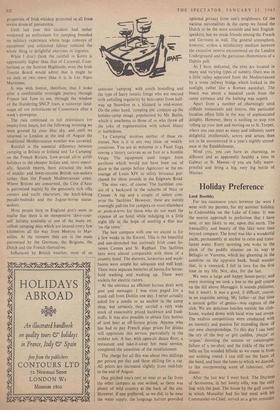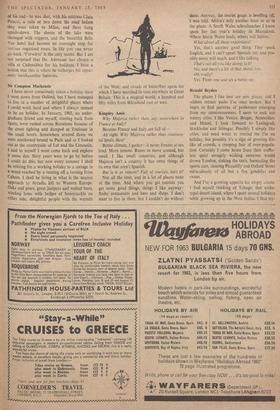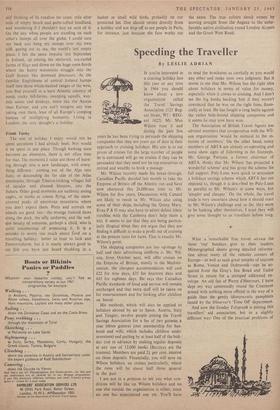Holiday Preference
Lord Boothby
For ten successive years between the wars I went with my parents, for my summer holiday, to Cadenabbia on the Lake of Como. It was the nearest approach to perfection that I have seen, or am likely to see, upon this earth. The tranquillity and beauty of this lake were then beyond compare. The hotel was like a wonderful yacht, permanently at anchor in calm and trans- lucent water. Every morning you woke to the plash of the paddle steamer on its way to Bellagio or Varenna, which lay gleaming in the sunshine on the opposite bank. Small wonder that, in a vineyard, I fell in love for the first time in my life. Not, alas, for the last.
We were a large and happy house-party; and every morning we took a bus to the golf course on the hill above Menaggio. It sounds philistine, but it wasn't. It was a good, if difficult, course, in an exquisite setting. My father—at that time a natural golfer of genius—was captain of the club. We ate delicious lunches outside the club- house, washed down with local wine and strega. The endless competitions were conducted with an intensity and passion far exceeding those of our own championships. To this day I can hear the cry of the boy or girl caddies, 'piazza' or 'acqua,' denoting the success or catastrophic failure of a tee-shot; and the tinkle of the cow- bells on the wooded hillside as we came in from our evening round. I can still see the faces of the band, and hum the tunes to which we danced, to the overpowering scent of tuberoses, after dinner.
After the last war 1 went back. The Duchess of Sermoneta, in her lovely villa, was the only link with the past. The house by the golf course, in which Mussolini had his last meal with his Commander-in-Chief, served as a grim reminder
of his end--he was shot, with his mistress Clara Petacci, a mile or two down the road before they were taken to Milan, and there hung upside-down. The shores of the lake were thronged with trippers, and the beautiful Belle Vue hotel had become an overnight stop for various organised tours. In life you can never go back. Tot-warts' is the only motto. But I am not surprised that Dr. Adenauer has chosen a villa at Cadenabbia for his holidays. I have a notion that this is where he recharges his appar- ently inexhaustible batteries.
Sir Compton Mackenzie I have never consciously taken a holiday since I went down from Oxford, but I have managed to live in a number of delightful places where I could work hard and where I always seemed to be on holiday. In January, 1902, an under- graduate friend and myself, coming back from Spain, were rushed across Barcelona because of the street fighting and dumped at Toulouse in the small hours. Somewhere around dawn we were northward bound to Paris and as I looked out at the countryside of Lot and the Limousin, I said to myself I must come back and explore it some day. Sixty years were to go by before I could do this, but now every summer I shall be retiring for a working holiday to a cottage in a wood reached by a turning off a turning from Cahors. I shall be living in what is the nearest approach to Arcadia left to Western Europe. Oaks and pines, great junipers and walnut trees, winding lanes with hedges of honeysuckle on either side; delightful people with the warmth of the Midi; and clouds of butterflies again for which I have searched in vain anywhere in Great Britain. This is a magical world, a hundred and fifty miles from Bikiniland east or west.
Kingsley Amis
Why Majorca rather than, say, somewhere in France or Italy?
Because France and Italy are full of— All right. Why Majorca rather than continen- tal Spain, then?
Better climate, I gather—it never freezes at sea level. More remote. Room to move around, but small. I like small countries, and although Majorca isn't a country it has some things of its own that aren't Spanish.
But is it so remote? Full of tourists, isn't it?
Not all the time, and in a lot of places none of the time. And where you get tourists you get some good things, things I like anyway: flashy restaurants and bars and shops. I don't want to live in them, but I couldn't do without them. Anyway, the tourist graph is levelling off, I was told. Africa's only another hour or so in the plane. A South Wales schoolteacher I know spent her last year's holiday in Marrakesh. Where .South Wales leads, others will follow.
What about all those expatriates?
Yes, that's another good thing. They speak English, and I can't speak Spanish yet, and pos- sibly never will much, and I like talking.
That's not all you like doing, is it?
No, and there's a lot of that about, too.
Oh, really?
Yes. From one and six a bottle up.
Ronald Bryden
The places I like best are new places, and seldom retrace paths I've once broken. But I begin to find patterns of preference emerging from my omnivorousness. I seem to seek out watery cities. I like Venice, Bruges, Amsterdam and Miami. I look forward to Leningrad, Stockholm and Srinagar. Possibly I simply like cities, and need water to remind me I'm on holiday, but possibly it's a sign of growing dis- like of crowds, a creeping fear of over-popula- tion. Certainly I come home from their traffic- less quiet savagely wishing someone would drown London, sinking the taxis, barnacling the sports cars, clearing Piccadilly and Oxford Street miraculously of all but a few gondolas and swans.
And I've a growing appetite for empty coasts. I find myself thinking of Tobago, that arche- typal desert island, where I spent several holidays while growing up in the West Indies. I find my- self thinking of its roadless lee coast, mile after mile of empty beach and palm-tufted headland, and wondering if I shouldn't buy an acre of it. On the day when people are standing on each other's insteps all over the globe, I could turn my back and hang my insteps over my own cliff, gazing out to sea, the world's last empty place. I felt the same impulse last September in Ireland, up among the sheltered, sea-curled farms of Sligo and down on the huge open fiords where the Kerry mountains straggle into the Gulf Stream like drowned dinosaurs. As the familiar Englishness of central Ireland humps itself into those whale-backed ranges of the west, you find yourself in a bare Atlantic country of steep, rocky hill-farms, sweeping squalls, way- side saints and donkeys, more like the Azores than Europe, and you can't imagine any tree taking root there, least of all Europe's creeping banyan of multiplying humanity. Living in London, the very thought's a holiday.
Frank Tuohy
The sort of holiday I enjoy would not be spent anywhere 1 had already been. Nor would it be spent in one place. Though basking soon becomes an obsession, there is not often time for that. The moments I value are those of burst- ing through into a new landscape, with every- thing different : coming out of the Alps into Italy, or descending the far side of the Atlas mountains, through Tibetan-looking villages full of squalor and almond blossom, into the Sahara. Other good moments are suddenly seeing eagles, or storks or cranes flying, or the snow- covered peaks of enormous mountains where you don't expect them. Ports and arrivals on islands are good, too: the strange tranced faces along the dock, the silly uniforms, and the sud- den beauty of someone, perhaps a child, who is quite unconscious of possessing it. It is a mistake to worry too much about fbod on a travelling holiday: better to trust to luck and - Enterovioform; but it is nearly always good to eat fish you have just heard thudding in a basket or small wild birds, probably on our protected list. One should return directly from a holiday and not stop off to see people in Paris, for instance, just because the fare works out the same. The true culture shock comes by moving straight from the Aegean to the unbe- lievable native civilisation round London Airport and the Great West Road.




































 Previous page
Previous page